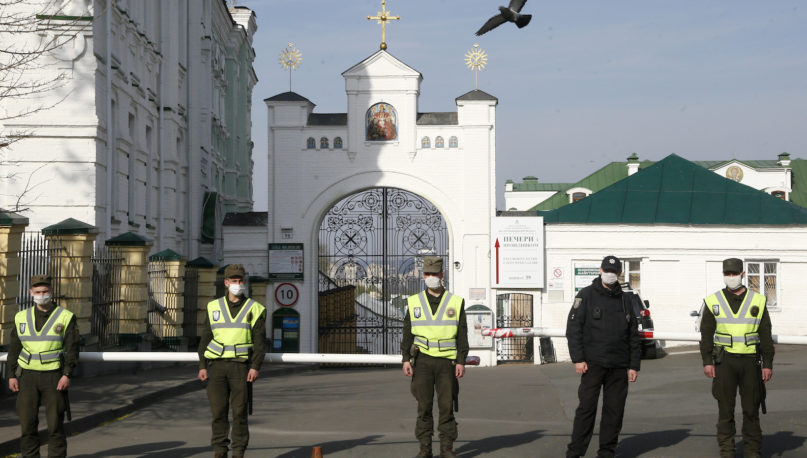KYIV, Ukraine (AP) — Ukraine’s two rival Orthodox churches clashed Thursday (April 16) over public health guidelines for forthcoming Easter celebrations, after the one said believers could gather outside places of worship despite a government ban on public gatherings due to the pandemic.
The head of the Moscow-affiliated Orthodox Church in Ukraine did urge believers to stay home and watch televised Easter services. But Metropolitan Onufriy added that those who wanted could come and pray outside churches while maintaining social distancing.
Orthodox Easter is celebrated this week, culminating in Easter Sunday on April 19.
The rival independent Orthodox Church criticized Onufriy’s statement Thursday, with its leader, Archbishop Yevstratiy, saying that it’s a “Christian duty” to take care of others and stay home amid the pandemic.
RELATED: Click here for complete coverage of COVID-19 on RNS
To emphasize the need for self-isolation, Yevstratiy pointed to an outbreak of 90 coronavirus cases at the historic Pechersk Monastery in Kyiv. The monastery, famous for its extensive system of caves and tunnels containing centuries-old cells for monks and burial places, was quarantined Monday.
Ukraine has registered 4,161 coronavirus cases, including 116 deaths.
Tensions between the two rival churches have heightened after Istanbul-based Ecumenical Patriarch Bartholomew I, who is considered first among equal Orthodox leaders, granted independence to the new Orthodox Church of Ukraine in 2019.
Many Ukrainians had resented the status of the Moscow-affiliated church, and the push for a full-fledged Ukrainian church intensified amid a tug-of-war between the two ex-Soviet neighbors that followed Moscow’s 2014 annexation of Ukraine’s Crimea and its support for a separatist insurgency in eastern Ukraine.
The move by Bartholomew, spiritual leader of the world’s 300 million Orthodox Christians, angered the Russian Orthodox Church, which cut ties with the Ecumenical Patriarchate. The issue has split the Orthodox world, with some churches supporting it and others criticizing the move.





